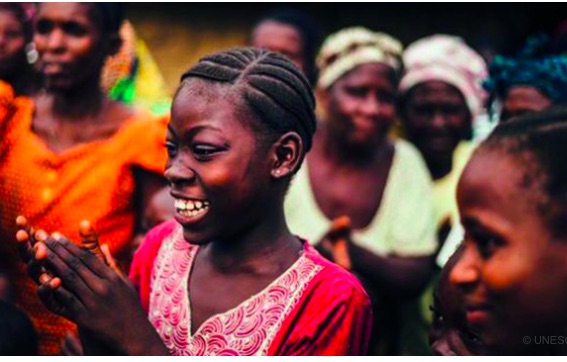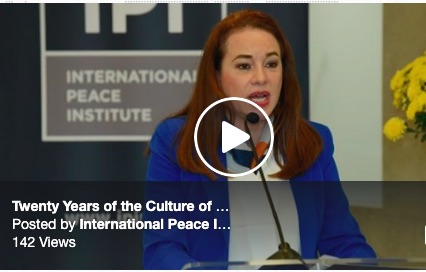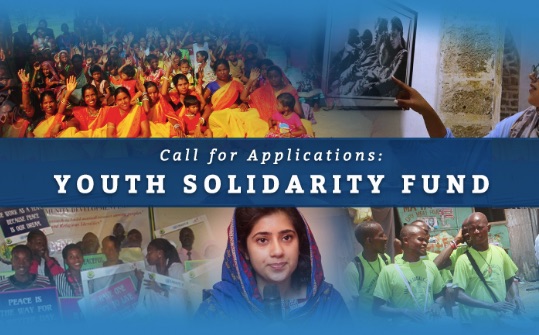FREE FLOW OF INFORMATION
An article from the United Nations (abbreviated)
The General Assembly today (December 12) adopted three resolutions on the culture of peace, highlighting the need to foster interreligious and cultural dialogue, temper social media and bolster education in efforts to prevent future clashes between and within societies.

Bangladesh Ambassador Rabab Fatima introduced the culture of peace resolution
Introducing a draft on “Promotion of interreligious and intercultural dialogue, understanding and cooperation for peace”, the Philippines’ representative said the resolution aimed to promote interreligious and intercultural dialogue in achieving peace and stability as well as strengthen constructive dialogue across divergent divides. The resolution also stresses the important role the United Nations Educational, Scientific and Cultural Organization (UNESCO) and the United National Alliance of Civilizations play in promoting interreligious and intercultural dialogue at all levels, he said.
Bangladesh’s delegate, introducing a text on “Follow‑up to the Declaration and Programme of Action on a Culture of Peace”, noted that it welcomes the High‑level Forum on Culture of Peace held on 13 September 2019, the twentieth anniversary of the adoption of the Declaration and Programme of Action. The Declaration and Programme of Action on a Culture of Peace continues to find relevance across the three pillars of the United Nations in addressing contemporary global challenges, he said.
A final text designates 20 July as World Chess Day . . .
Addressing the drafts, delegates warned that clashing cultures are a growing reality in numerous societies, with antisemitism resurfacing and Islamophobia becoming more pervasive. Libya’s representative pointed to waves of violence, displacement, death and destruction due to increases in violent extremism, terrorism and hatred. “It is sad to see flagrant and daily violations of human rights,” he said.
They also observed that the international community today is facing more complex challenges undermining the culture of peace than in the past, including religious tensions and violence. Kuwait’s representative observed that violent extremism is used as a mode of expression on social networks, stressing that the international community must ban content inciting extremism and terrorism.
Also arguing that social media platforms can threaten the culture of peace, Saudi Arabia’s delegate emphasized that using digital messages constructively can achieve the opposite result. Echoing that sentiment, Ecuador’s representative emphasized that the more such media are used to disseminate hate speech the more people must use positive digital missives to counter them.
Several speakers emphasized the importance of quality education and dialogue as tools to forge peaceful understanding between countries and societies. Interreligious and intercultural dialogues with faith leaders, civil society and academia are important for building intellectual and moral solidarity, India’s delegate said. Home to a significant number of practitioners of practically every major religion in the world, his country is a narrative of conversations between different civilizations, he said. . . .
The Assembly had before it two reports of the Secretary‑General on “A world against violence and violent extremism,” (document A/74/195) and “Promotion of a culture of peace and interreligious and intercultural dialogue, understanding and cooperation for peace (document A/74/476).
Also speaking today were the representatives of Sweden, Saint Kitts and Nevis, Thailand (on behalf of the Association of Southeast Asian Nations), Venezuela, United Arab Emirates, Maldives, Cuba, Morocco, Panama, Pakistan, Brunei Darussalam, Azerbaijan, Canada, Nicaragua and United States, as well as an observer for the Holy See. . . .
Introduction of Draft Resolutions
RABAB FATIMA (Bangladesh), introducing the draft resolution titled “Follow‑up to the Declaration and Programme of Action on a Culture of Peace” (document A/74/L.23), said the text welcomes the High‑level Forum on Culture of Peace held on 13 September 2019, the twentieth anniversary of the adoption of the Declaration and Programme of Action. Bangladesh appreciates that the Declaration and Programme of Action on a Culture of Peace continues to find relevance across the three pillars of the United Nations in addressing contemporary global challenges. It further appreciates that the High‑level Forum provided an opportunity for Member States, United Nations entities, civil society, non‑governmental organizations and other stakeholders to exchange ideas and make suggestions on how to build on and further promote the culture of peace in the twenty‑first century. Finally, the text notes its support for Member States in promoting the culture of peace at the national level. . . .
KIRA CHRISTIANNE DANGANAN AZUCENA (Philippines), introducing the draft resolution titled “Promotion of interreligious and intercultural dialogue, understanding and cooperation for peace” (document L/74/L.25), said that the international community is experiencing a growing trend of xenophobia and religious intolerance, underpinned by the politics of identity, as well as the emergence of extremist ideologies. There was a time when terror was the weapon of the weak against the strong in fights for freedom and justice. Today, terror is pursued for itself. It is not a means but the end that terrorism seeks: a society built on fear where every person is afraid of another.
(continued in right column)
What is the United Nations doing for a culture of peace?
(continued from left column)
This annual resolution is more relevant than ever and has two aims: to promote interreligious and intercultural dialogue to achieve peace and stability, and to strengthen the mechanism that promises constructive dialogue across the most divergent divides, she said. The Philippines strived to use the objectives of this resolution by maintaining an open, inclusive and transparent approach during the negotiation process. An example of this is operative paragraph 9, which appreciates the landmark initiative to open up the Kartarpur Sahib Corridor and welcomes the agreement achieved between Pakistan and India in record time. The resolution also stresses the important role of United Nations Educational, Scientific and Cultural Organization (UNESCO) and the invaluable contributions of the United National Alliance of Civilizations in promoting interreligious and intercultural dialogue at all levels.
Statements
VITAVAS SRIVIHOK (Thailand), speaking on behalf of the Association of Southeast Asian Nations (ASEAN), said that ASEAN continues to advance the vision the association had when it was founded 52 years ago: to have an integrated, peaceful and stable community throughout the region which enjoys prosperity, lasting peace and stability. The association’s decision‑making process has been carried out in the ASEAN way: completed with the consensus of all 10 member countries. The ASEAN way has worked to expand peace and stability in the region, and it carries out the same process with its dialogue partners to within the region and beyond its borders.
ASEAN continues to engage in meaningful dialogue with its external partners through ASEAN‑led mechanisms, such as the Preventive Diplomacy and Confidence‑Building Measures under the ASEAN Regional Forum, he continued. ASEAN also supports the Security Council’s women, peace and security agenda and multi‑stakeholder initiatives. For example, the ASEAN Youth Volunteer Programme helps foster a culture of peace through the active participation of women and youth. ASEAN believes that the promotion of cooperation on sustainable development also helps foster a culture of peace, he said.
CARLOS RON MARTÍNEZ, Vice Minister for Foreign Affairs for North America of Venezuela, said that building and strengthening a culture of peace calls for real commitment from the international community. This must go beyond occasional speeches to real action. Achieving solidarity with the most vulnerable people is essential in this regard. “We must understand each other and recognize each other without judging each other,” he added. A world of peace will only be possible when social justice, health, food and dignity are accessible to all people regardless of their social class, gender or any other construct. Venezuela rejects xenophobia and discrimination.
Political will and dialogue without exclusion and under equal conditions will allow people to feel like real actors of change in the world, he continued. Venezuela has made major contributions to multilateralism, cooperation and solidarity. This has been recognized by various States, social movements and academics. The country remains involved in initiatives that promote economic solidarity, self‑determination and peaceful coexistence. Venezuela is also dedicated to establishing a judicial system that strengthens peace, integrity and the rule of law. He condemned the illegal implementation of unilateral coercive measures by the United States against his country. “They are criminal and inhumane collective punishment,” he said, demanding such measures be lifted immediately. . . .
AHMED NASIR (Maldives) said that education is a key element in cultivating and nurturing a culture of peace. Despite much progress in that regard, there are still some 262 million children worldwide who do not go to school. Inequality remains one of the biggest obstacles to creating a culture of peace. For decades, Maldivians who lived in islands outside of the greater Malé region have not had the same level of development or access to the same basic resources. They have not been accorded the same level of priority in policymaking circles. The current Government is committed to implementing a decentralization policy aimed at rectifying this. The Declaration and Programme of Action on a culture of peace rightly identifies Governments, civil society, media and individuals as key actors for its effective implementation. Moreover, he said that without adequate regulation, social media has become a tool to spread populist rhetoric, political extremism, racism, xenophobia and falsehoods. “We call on social media companies to take more responsibility, especially in monitoring divisive content,” he said.
Mr. ALMABROK (Libya) said the world is witnessing waves of violence, displacement, death and destruction, due to an increase of violent extremism, terrorism and hatred. The root causes are poverty, unemployment, impunity and marginalization. “It is sad to see flagrant and daily violations of human rights,” he said, calling on all countries to work together to provide greater resources and the courage to put an end to these violations. Peace can only exist where there is justice. He expressed concern that unregulated social media is exposing young people to extremist ideology. Member States should demonstrate a collective will to resolve conflict and war and refrain from interfering in the internal affairs of sovereign States. Respect for cultural and religious diversity is also important.
ANA SILVIA RODRÍGUEZ ABASCAL (Cuba), warning that the world today produces more bullets than books, stressed that so long as nuclear deterrence is used as a method to contain war, human beings will not enjoy a culture of peace. There can be no peace without full respect for the sovereignty and territorial integrity of States and the self‑determination of peoples. The use of unilateral coercive measures as a foreign policy tool must cease. Ending the economic, commercial and financial blockade imposed by the United States against Cuba would be an action in favor of peace. There is no culture of peace when the United States launches a new slander campaign to discredit Cuba, she stressed. . . .
YASHAR ALIYEV (Azerbaijan) said that the Baku Process has proved itself as one of the leading international platforms to foster dialogue and cultural diversity. Its important role was emphasized by the Secretary‑General in his report to the Assembly’s seventy‑second session and most recently, in the outcome documents of the eighteenth Summit of Heads of State and Government of the Non‑Aligned Movement, held on 25 to 26 October in Azerbaijan. An integral part of the Baku Process is the World Forum on Intercultural Dialogue, organized biennially by Azerbaijan since 2011 in partnership with UNESCO, the Alliance of Civilizations, the World Tourism Organization, the Council of Europe and the Islamic Educational, Scientific and Cultural Organization. The fifth World Forum on Intercultural Dialogue, which took place this May in Baku, focused on dialogue as an instrument for action against discrimination, inequality and violent conflict. In November, Azerbaijan hosted the second Summit of World Religious Leaders, which drew participants from about 70 countries, and adopted the Baku Declaration at its outcome. The outcome emphasized the role of religious leaders in promoting inter-religious and intercultural dialogue. . . .








